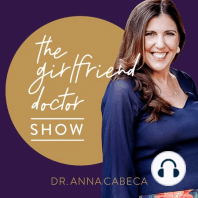67 min listen

How To Take Control Of Your Reproductive Health
How To Take Control Of Your Reproductive Health
ratings:
Length:
37 minutes
Released:
Nov 24, 2019
Format:
Podcast episode
Description
Your menstrual cycle gives you more indication into your body’s overall health than just whether you have a regular period or not. As Lisa Hendrickson-Jack shares, by charting your menstrual cycle, you can not only track your fertility, you can also uncover other health problems you might not be aware of. Lisa is a holistic reproductive health practitioner, the author of The Fifth Vital Sign, blogger and podcast host at Fertility Friday, and has been using fertility awareness for 20 years as her primary birth control. On this podcast, Lisa explains what aspects of your menstrual cycle you should notice and track, from the color of your period blood to the length of your bleed to how your cervical mucus changes throughout your cycle. Did you know that having pain during menstruation is actually a sign that your body isn’t at optimal health? We’re taught that women experiencing cramps is normal during our pre-menstrual time, but when is pain ever something normal? Pain is a sign that something is wrong in our body. Lisa explains how over our menstrual years, our cycle will change. When we first get our period, our cycles might be longer than what’s considered normal (24-35 days). But as long as your cycle falls inside these normal parameters as an adult, you probably don’t have anything to worry about, at least on this front. Ovulating regularly, and, in turn, having a regular period, is important for the entire health of your body. Regular ovulation helps regulate your hormone levels, especially progesterone, as this hormone is incredibly important for our overall health. This is one of the reasons why hormonal birth control can negatively impact our health - the pill essentially takes us into false menopause, disrupting the natural rhythm of our hormones. Lisa shares some more natural birth control methods, including fertility awareness and non-hormonal birth control. She explains exactly how long we’re fertile for during our cycle (10 days!) and why you should take extra precautions during this time to prevent pregnancy. Do you have a regular menstrual cycle? Have you ever charted your cycle changes? Do you experience painful cramping at the start of your period? In This Episode: How charting your menstrual cycle can indicate other health problems What aspects of your menstrual cycle you should notice How much pain is normal during your menstrual cycle How your menstrual cycle will change as you age What role ovulation has for the health of your entire body How hormonal birth control negatively affects your health What some natural birth control methods are How long are you fertile for in your cycle Quotes: “As women, we have this amazing gift to be able to track our health just by paying attention to our cycles.” (6:05) “Having healthy menstrual cycles, regular ovulatory cycles, ovulating, and producing progesterone is really important for us to achieve optimal health.” (19:54) “If you were to draw the blood of 6,000 women who are on the pill, they’re all going to have up to 60% lower testosterone than a woman who’s not on the pill.” (26:04) Links Get Your Free Fertility Awareness Video Series Find Lisa Hendrickson-Jack Online Find Lisa Hendrickson-Jack on Instagram | Facebook | Twitter Check out the full episode page Find Dr. Anna Online Follow Dr. Anna on Facebook | Instagram | Twitter
Released:
Nov 24, 2019
Format:
Podcast episode
Titles in the series (100)
Secrets to a Flat Belly - 7 day Allergy Makeover Tips: Join me on the couch with my dear friend Dr. Susanne Bennett. Susanne is a leading expert on allergies and just published her new book! Did you know that FATIGUE and lack of FOCUS (aka “brain fog”) are two of the most common “hidden” symptoms of a by The Girlfriend Doctor w/ Dr. Anna Cabeca